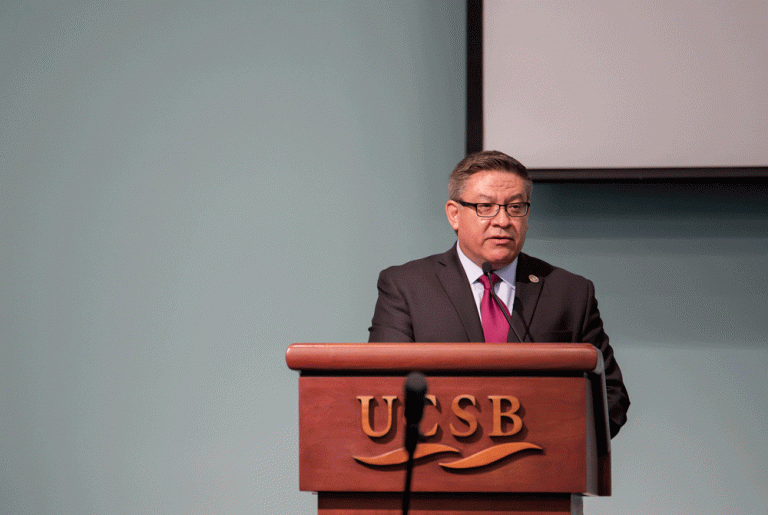
Maya Chandy
The Environmental Affairs Board hosted a town hall discussion with Congressman Salud Carbajal on Tuesday to provide students, faculty, and citizens of California’s 24th district with an open forum to express their current perspectives.
The event focused primarily on the environment, education, and immigration, but extended to topics like sexual assault and health care.
A crowd of over 40 at Corwin Pavilion provided input on the implementation of policy, assessed the strides the congressman has made so far, and acquired information regarding the changes that Carbajal and other politicians have recently established.
Carbajal started the evening by bringing attention to over 60 bills he had sponsored or co-sponsored during his first 100 days in office. He also gave his opinion of the recent actions of the Trump administration.
When discussing the nation’s current political climate, Carbajal suggested that these are “dangerous times for our country,” provided that President Donald Trump “favors alternative facts” and is especially “unorthodox.”
“The person leading our Environmental Protection Agency does not believe in climate change,” Carbajal reminded his listeners.
In order to combat the challenges he and other more liberal legislators are facing, Carbajal has worked to promote several bills that lower interest rates on government-based student loans and ensure that refugees and U.S. citizens from predominantly Muslim countries remain secure.
Most notably, Carbajal recently introduced the California Clean Coast Bill. The bill would prevent drilling along California’s coastline. When asked by a student about the bill, Carbajal admitted that the bill may not hold up in a Republican-controlled Congress. He said, however, that there is a chance the bill will obtain bipartisanship. Regardless, he said, it is his responsibility to keep the Democratic voice strong and provoke discourse.
Carbajal mentioned that he is trying to be a “loud voice” to find more advocates, both Republican and Democratic. He went on to say he is especially passionate about drilling along the coastline, since drilling affects California’s public beaches and the state’s economy. Furthermore, he said, the U.S. should seek a long-term, sustainable source of energy, rather than rely on fossil fuels.
He also provided an example of the influence that citizens can have on the decision-making process. Republicans were unable to repeal the Affordable Care Act largely because of civil involvement, he mentioned. Because of the resentment expressed by U.S. citizens, Congress “had no choice but to listen,” he said.
Several students brought up the topic of food insecurity on campus. One student said that approximately 25 percent of students have experienced some type of insecurity due to their exponentially increasing college expenses. Food insecurity can mean anything from skipping a meal to curb costs to being uncertain as to how to obtain food for the duration of an entire quarter.
“Financial institutions needed to stop profiteering off students,” Carbajal said. He added that the country needs to have programs in place that allow for the refinancing and forgiveness of loans.
Another student said that when students are sexually assaulted, they are often hesitant to come forward, concerned that they will not be taken seriously. In response, Carbajal said that the education system needs to provide more information surrounding assault to ensure that both men and women do not feel threatened on campuses.
“We focus on just putting everyone towards a college education,” Carbajal said, “due to a lack of alternative avenues.”
Carbajal stressed how the issue touches him closely because his own brother had sought a career in the military, believing a traditional college education did not suit him. According to him, the country could benefit from investing in trade schools and vocational training programs.
Several students brought up Trump’s executive order, which closed U.S. borders to refugees and even some legal U.S. occupants from several predominantly Muslim nations.
As an immigrant, Carbajal said he related to those who felt that they experienced some inequality based on their appearances. He acknowledged that discrimination based on religion or skin color is absolutely unjustified. Carbajal added that the U.S. already has “one of the most robust vetting processes.” He noted that immigrants can certainly productively contribute to the nation.
Despite recent political events, Carbajal repeatedly reminded his listeners of the importance of civil responsibility and emphasized that being involved plays a fundamental role in initiating change.










